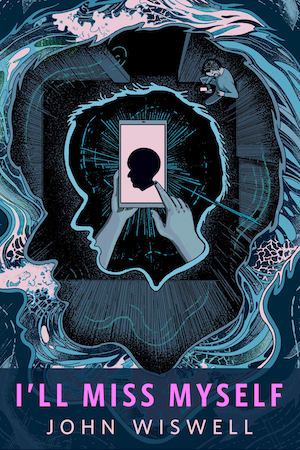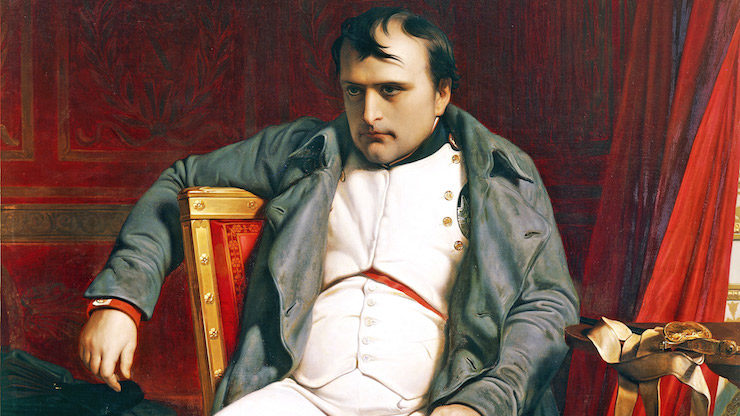Napoleon could’ve been the proud owner of the very first submarine, or he could’ve commanded the first steam-powered warship. If Napoleon hadn’t literally missed those two boats, we might all be speaking French.
Woulda. Coulda. Shoulda.
Most people believe attacking Russia in the winter was Napoleon’s undoing. It was an undeniable failure, but I disagree. Sometimes it’s that one unthinking moment, that one terrible, horrible, no good, very bad decision that truly sinks us. Such is the case with Napoleon. Here’s what I believe led to the emperor’s ruin.
Napoleon itched to conquer the Brits. In his quest to take over Britain, he laid plans worthy of any evil genius.
While researching background for my novel, A School for Unusual Girls, I discovered that Napoleon had plans to dig a tunnel under the channel. If that didn’t work out, he considered launching an aerial attack using hydrogen powered air balloons. Airships. I’m not kidding. Sounds like a steampunk plot, doesn’t it?
He also had the idea to build a gigantic wind powered barge—a huge raft—as big as our modern aircraft carriers, to ferry his troops across to Dover.
Grandiose schemes?
You bet. But here we are 210 years later and the Chunnel, which didn’t open for traffic until 1995, is built in the exact location my favorite evil genius intended to build it.
Here’s a peek at what his drawing board may have looked like…
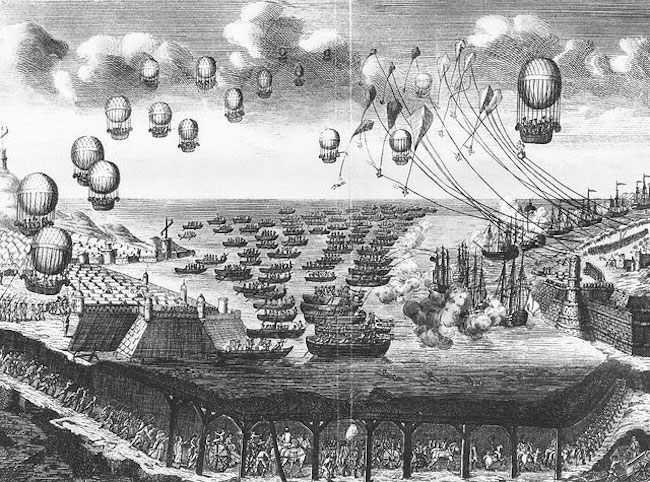
Clearly Napoleon was a man ahead of his time. He had a team of engineers and commissioned scientists from other countries to design weaponry and attack vessels. Does this remind you of some of the James Bond super villains? One of Napoleon’s foreign scientists included the brilliant American inventor, Robert Fulton. Yep, the very same Robert Fulton who invented the steamship.
Therein lies the rub. When Fulton presented his design for a steam-powered warship to Napoleon, the emperor scooted back from the table and had a Pinky and the Brain moment. He stood, hand on the hilt of his sword, and said, “What, sir? You would make a ship sail against the wind and currents by lighting a bonfire under her decks? I pray you excuse me. I have no time to listen to such nonsense.”
That was Napoleon’s terrible, horrible, no good, very bad mistake. And here you thought Alexander had a bad day.
If Napoleon had built those steam-powered ships he could’ve swiftly and easily crossed the channel and England would now be a French speaking province. Mind you, I’m very glad things worked out as they did. But why? Why did this man with so much foresight and genius reject Fulton’s amazing inventions?
Robert Fulton also designed a submarine for the French. Can you believe it? A genuine submarine. Guess what he named it… the Nautilus.
I bet your mind leapt straight to 20,000 Leagues Under the Sea, right? Jules Verne (another of my beloved geniuses) named his fictional craft after Fulton’s actual submarine as a tribute to his fellow scientist. After all, Verne was a man of science long before he fell in love with writing fiction.
Fulton’s amazing mini-sub was an incredible feat of engineering for the time. It moved through the water using a hand-crank propeller. He tested it in the Seine. Three men stayed inside under twenty-five feet of water for more than an hour. They were able to travel faster than four men rowing on the surface. And get this—he even built a torpedo—a torpedo that in that same test blasted apart the hull of an abandoned ship.
The idea of trying to sneak up on their enemies underwater excited Napoleon’s engineers. They oversaw Fulton’s development of the Nautilus. Unfortunately, later in the year, when Napoleon came to watch another test on the Seine, the Nautilus leaked.
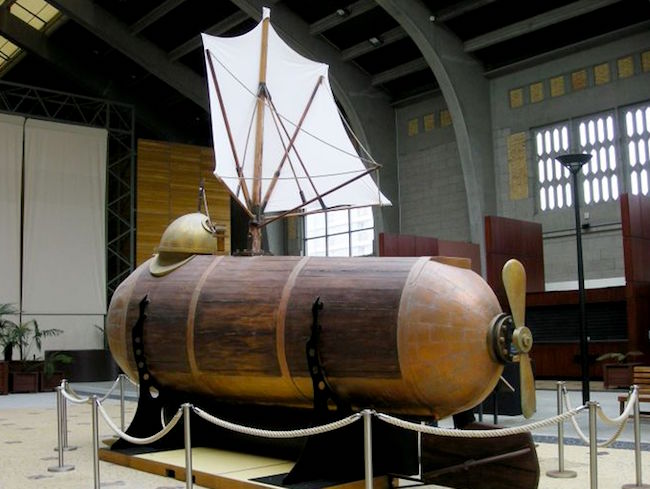
Exasperated, Napoleon decided Fulton was a fraud and sent him packing.
Naturally, the British were delighted to invite Fulton to design weapons for them. Although, it wasn’t until he went back to America that the inventor found financial backing to build his steam-powered warship, a warship that could’ve been Napoleon’s.
Back to our question…
Here’s Napoleon, a guy who thinks he can conquer the world, and nearly does. He dreams of flying hot air balloons to attack his British nemesis. He designed a gigantic barge big enough to carry a legion across the channel. He even considered digging a tunnel under the ocean.
But what, he can’t see the value of a steamship… it begs the question. Why?
As you may have guessed, I’ve got a theory. I call it: the problem of two small super geniuses in this crazy, mixed-up world theory.
Napoleon fascinates me. I love working with him as the background conflict in the Stranje House novels. He is the quintessential super villain: suave, rich, a phenomenally compelling leader and a brilliant strategist. Simply put, Napoleon Bonaparte is a science-fiction-worthy genius with an unfortunate case of megalomania.
Think of him like Lex Luthor, only played by somebody super cool like, say, Billy Zane, except short.
When Napoleon walked into a crowded room, he was used to being the biggest, baddest dude there. Well, scratch that, he was short. But one thing Napoleon knew for sure, he was the smartest guy in the room. Oh, who am I kidding? He was used to being the most intelligent guy in all of France—maybe the whole world.
It didn’t matter if he was short and balding, he was the all-powerful emperor of France and the brightest thinker in Europe.
Enemies cowered. His lieutenants bowed low. Women swooned.
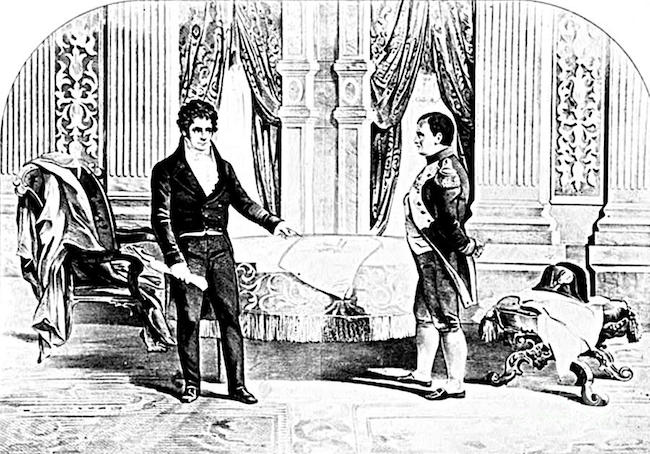
Enter Robert Fulton, a good-looking, likeable guy, sporting a head full of dark curly hair and a gutsy can-do attitude. Unless I miss my guess, Fulton had a pretty clear notion that he was one of the brighter candles in the candelabra.
He had ideas. Big ideas. Exciting ideas. He was going places. Doing things.
I doubt a fellow like Robert Fulton tiptoed around the emperor’s temperamental ego. Fulton was excited about his inventions, eager to discuss their potential, and confident of their worth.
Take two geniuses, add a spoonful of jealousy, a dollop of over-zealousness, a heaping cup of super ego, give it a vigorous stir and stand back while it erupts.
And there you have it: the burr under Napoleon’s proverbial saddle, the reason he made his terrible, horrible, no good, very bad mistake.
There was no way Napoleon was going to allow someone with as much genius as Robert Fulton to stand on his stage. His ego wouldn’t allow it. Thus, he made one of the most crushing decisions of his otherwise strategically amazing career.
I’m so intrigued by the personality clash between these two men that I wrote Robert Fulton’s fictional nephew into book two of my Stranje House novels. And of course, Napoleon looms large in the background. Why not? He was an irresistible super villain.
The article was originally published in June 2015.
 Kathleen Baldwin has written several award-winning traditional Regency romances for adults, including Lady Fiasco, winner of Cataromance’s Best Traditional Regency, and Mistaken Kiss, a Holt Medallion Finalist. The Stranje House series—A School for Unusual Girls, Exile for Dreamers, and Refuge for Masterminds—is available from Tor Teen. She lives in Texas with her family.
Kathleen Baldwin has written several award-winning traditional Regency romances for adults, including Lady Fiasco, winner of Cataromance’s Best Traditional Regency, and Mistaken Kiss, a Holt Medallion Finalist. The Stranje House series—A School for Unusual Girls, Exile for Dreamers, and Refuge for Masterminds—is available from Tor Teen. She lives in Texas with her family.




